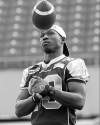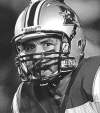One brain per customer, doc warns Buck
'Once it's gone, it's gone,' expert says
Advertisement
Read this article for free:
or
Already have an account? Log in here »
To continue reading, please subscribe:
Monthly Digital Subscription
$0 for the first 4 weeks*
- Enjoy unlimited reading on winnipegfreepress.com
- Read the E-Edition, our digital replica newspaper
- Access News Break, our award-winning app
- Play interactive puzzles
*No charge for 4 weeks then price increases to the regular rate of $19.00 plus GST every four weeks. Offer available to new and qualified returning subscribers only. Cancel any time.
Monthly Digital Subscription
$4.75/week*
- Enjoy unlimited reading on winnipegfreepress.com
- Read the E-Edition, our digital replica newspaper
- Access News Break, our award-winning app
- Play interactive puzzles
*Billed as $19 plus GST every four weeks. Cancel any time.
To continue reading, please subscribe:
Add Free Press access to your Brandon Sun subscription for only an additional
$1 for the first 4 weeks*
*Your next subscription payment will increase by $1.00 and you will be charged $16.99 plus GST for four weeks. After four weeks, your payment will increase to $23.99 plus GST every four weeks.
Read unlimited articles for free today:
or
Already have an account? Log in here »
Hey there, time traveller!
This article was published 05/10/2012 (4781 days ago), so information in it may no longer be current.
He’s seen and heard almost all of this before during his extensive research but neurosurgeon Dr. Charles Tator never fails to be concerned about concussed athletes, their treatments and their decisions.
And one of Canada’s top authorities on concussions is aware of the attention Winnipeg Blue Bombers quarterback Buck Pierce has been receiving since absorbing a helmet-to-helmet blow in last Saturday’s CFL game in Winnipeg.
“We do see players put back on too quickly,” Tator said Thursday from his office at Toronto Western Hospital, giving a general assessment of scenarios, both amateur and professional. “No doubt about that. In general, you really should not go back for at least a week. A week is the minimum. And for children and youth, it should be double that, because children’s brains are that much more susceptible to concussion and take that much longer to recover.”

Tator, who continues his work at TWH’s Krembil Neuroscience Centre, is also a founder of ThinkFirst Canada, a coast-to-coast educational and awareness effort targeting young people and safety, particularly in sports.
He said the concern for concussed athletes should be sharply increased when it’s not a first concussion.
“Sometimes with repetitive concussions, it should be longer because after repeated concussions, the brain is that much more sensitive to the next one,” he said. “In other words, the force necessary to produce the fifth concussion is less than what produced the fourth concussion. And also we’ve learned that it takes longer to get over the fifth concussion than the fourth concussion.
“So the advice to an individual athlete after a concussion is affected by all of that — how severe the blow was, how severe the symptoms are, how many have you had in the past, how quickly did you recover from previous concussions, all of that is very important.”
Tator expressed alarm but not surprise at other comments he’s heard surrounding the Pierce case this week, including that from Bombers’ slotback Terrence Edwards on winning at all costs, even in the case of blows to the head. “Even if that means lying to doctors, that’s what you’re going to do,” Edwards said.
“They’re jeopardizing their future when they use phrases like that,” Tator said. “If you’re not truthful, the doctor will have that much more difficulty in providing good advice. That’s mainly because we don’t have good diagnostic tests for concussions.
“I was at a meeting last weekend in Washington where we discussed the imaging of concussion. I can tell you we’re just at the beginning. We don’t have a good CT scan or MRI test for concussion. And so the best we have is a trained examiner like a doctor who’s knowledgable. But the truthful patient is even more important.
“If the patient wants to fudge it, the doctor won’t be able to detect if the patient is fudging it. Athletes who are concussed who don’t tell the truth are putting their brains at risk and jeopardizing their futures.
“You still only get one brain, one per customer. Once it’s gone, it’s gone. Because we do not have good treatment for brain injuries like concussions. We are looking for good treatments and every day something comes across my desk as a potential breakthrough but I can tell you there’s nothing that is scientifically proven to accelerate recovery from concussion or to restore what a person has lost.
“And we can’t give you a drug to protect you against the next concussion.”
Tator also expressed his dislike for something else that’s been bandied about in Winnipeg this week, and is very common in the world of sports — the phrase “mild concussion.”
“I think the term ‘mild concussion’ is an oxymoron because a brain injury is anything but mild,” he said. “So a concussion is a brain injury and especially if it’s repetitive.
“A lot of doctors use the term ‘mild traumatic brain injury,’ as almost synonymous with concussion. I don’t like that term personally but a lot of doctors do and at least when they say, ‘mild traumatic brain injury,’ it does label it as a brain injury.”
tim.campbell@freepress.mb.ca










